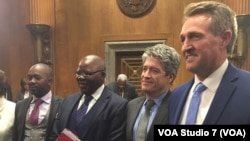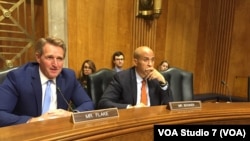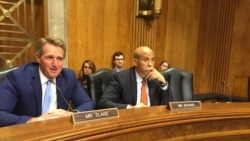The United States is cautiously considering re-engaging Zimbabwe, following the resignation of former President Robert Mugabe, but it remains skeptical of how relations would improve, given that Zimbabwe’s new president is a close ally of Mr. Mugabe, and been accused of atrocities dating back to the 1980’s.
Several members of the U.S. Senate Committee on Foreign Relations raised these concerns at a hearing in Washington, Tuesday, titled, “The Future of Zimbabwe,” where they sought insights on developments and possibilities from a panel of experts on Zimbabwe, which comprised a representative from the U.S. State Department, and several prominent Zimbabweans.
Laying the foundation for the deep mistrust surrounding Zimbabwe’s new President Emmerson Mnangagwa, Republican Senator Jeff Flake, who described Zimbabwe as a “nightmare” questioned how much change can be expected under President Mnangagwa, who has faced allegations of human rights violations during his tenure in government, which included being a minister of state security and justice.
“President Mnangagwa is not unknown to us,” said Flake, recalling that, “until his dismissal as first vice president last month, he had been closely aligned to President Mugabe, since Mugabe’s rise to power. He stands accused orchestrating a string of massacres in the early 80’s to consolidate Mugabe’s power, leaving as many as 20-thousand dead in Matabeleland,” Flake said.
Almost all the Senate members, namely Democrats Cory Booker of New Jersey and Christopher Coons of Delaware, referenced the atrocities committed by the North-Korean trained fifth brigade in the Matabeleland and Midlands regions in the 1980’s, also referred to as Gukurahundi, as blemishes on Mnangagwa’ s record.
Coons, who said he was happy to see Mr. Mugabe leave after 37-years in office, queried the kind of reforms that could be expected under Mnangagwa, given his close relationship with Mugabe. Coons indicated that the U.S. would maintain the targeted sanctions on Zimbabwe if there was no indication of reform.
“I think it’s critical that the people of Zimbabwe not see one dictator replaced by another and so for one I am reluctant to see us take any steps to lighten or relieve sanctions or other international restrictions on loans or partnerships until we see … concrete steps by the administration of Emmerson Mnangagwa or any successors,” Coons said.
Honorable Stephanie Sullivan of the Bureau of African Affairs in the U.S. State Department, agreed, pointing to areas that she said would need to show improvement before any policy or other changes can be expected from the U.S.
“As far as governance goes and respect for human rights, we would like to see immediate implementation of freedom of expression that has been lacking for decades in Zimbabwe, freedom of assembly, we are looking also for a free and responsible media including social media, the preparations for elections as I mentioned, anti-corruption I believe they have given a 90-day window for people to return ill-gotten gains as amnesty,” said Sullivan. “On the economic side the country is crumbling under crushing debt, and we also have a very low, doing business climate that is a deterrent, we’d like to see an improved investment climate.” A third condition she stipulated, “Security sector we’d like to see the security sector earn the trust of the citizens, and that would include police reforms.”
Asked what they would like to see the U.S. to ensure that true democracy takes place in Zimbabwe and that Mnangagwa and his government will be held accountable for their actions, opposition leader Tendai Biti of the Progressive Democratic Party, lawyer Dewa Mavhinga of Human Rights Watch and author and activist Peter Godwin, who all served as witnesses, said they’d like to see continued U.S. engagement with Zimbabwe.
Mavhinga urged the U.S. to work with African organizations such as the African Union to ensure that elections scheduled for 2018 are conducted in a free and fair environment.
“The U.S. could strongly push the African Union and other players to insist on a roadmap for democratic elections, and to then say as my colleagues have said, that a key benchmark really to review relations, is an independent assessment of the environment in which the 2018 elections will be held,” said Mavhinga
Former finance minister and now opposition leader of the People’s Democratic Party, (PDP), Tendai Biti, who was speaking in his capacity as a member of the MDC Alliance stressed the importance of continued U.S. engagement with the youth of Zimbabwe and its citizens in general.
“The United States Congress must continue to do what it has done very well in the past – number one, interface with our people,” said Biti. “The United States remains the biggest donor and supplier of overseas assistance in Zimbabwe. You are very active in our health sector for instance ---that support must continue.”
Author and activist Peter Godwin, also from Zimbabwe, urged the U.S. to try a new approach to pressuring Zimbabwe to reform, including bringing together all progressive forces of change as well as donors, to incentivize the new government to take better care of its citizens.
Godwin also challenged the U.S. to lift the sanctions on Zimbabwe, to see test the new government’s commitment to change.
“And that way you take the excuse of sanctions and whatever, so you take it back and flip it,” said Godwin. “That would be a way to prioritize the carrot over the stick, and mix it up and see if it works.”







